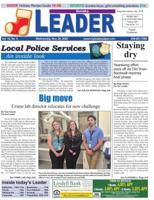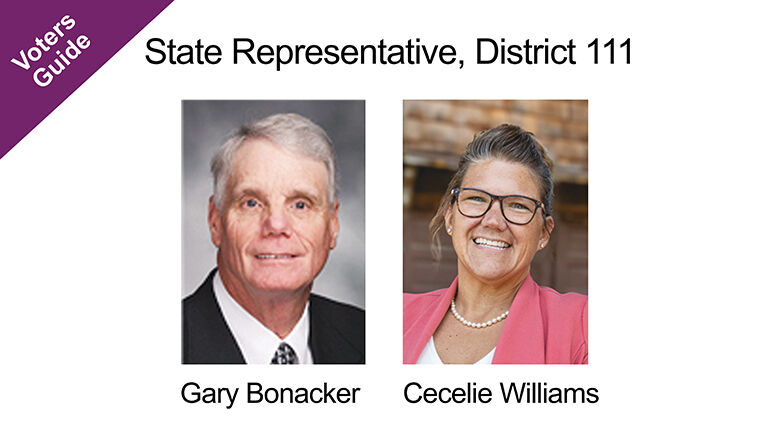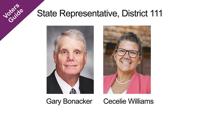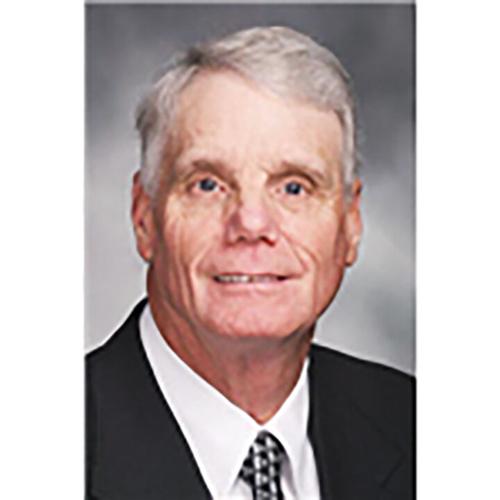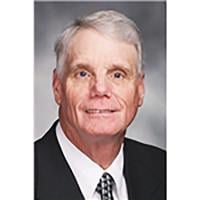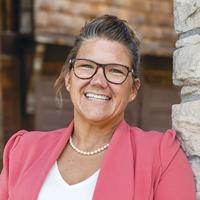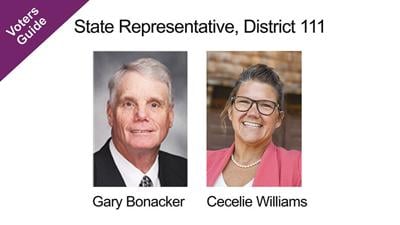Incumbent Gary Bonacker of House Springs is seeking his second term as the state representative for District 111. He is being challenged Cecelie Williams of Dittmer in the Republican primary. No Democrat filed so the winner of the primary will be the winner of the race.
District 111 is the western part of Jefferson County.
According to the 2023-2024 Official Manual State of Missouri, state legislators received a salary of $39,264.
Bonacker, 68, of House Springs is a farmer. He is married to Cheryl and has one son and two grandsons. Bonacker graduated from Northwest High School and completed some classes at the University of Missouri in Columbia.
For the past five years, he has been chairman of the Jefferson County Soil and Water Conservation District, and he is a member of the Northwest School District Board of Education, serving as the board secretary for most of his time on that board.

Gary Bonacker
Williams, 43, of Dittmer owns the Turf One landscape management company. She and her husband, Rich, have seven children and two grandchildren. She is a 1999 Grandview High School graduate. She has served on the Big River Ambulance board, as secretary of the Jefferson County Republican Club and president of the Northwest Football Booster Club.

Cecelie Williams
What experience do you have that might serve you in this position?
Bonacker: Having 100-hour work weeks kept me from doing much else until 2008, but my time with the Conservation District and the Northwest school board since then has opened my eyes to government and how it works. It can be so helpful to be on both sides of funding and regulations.
Williams: I’ve led teams as part of community groups and volunteer projects that had us working together to achieve goals. These experiences taught me how to bring people together, solve problems and get things done. In a government role, these skills would help me listen to everyone’s ideas, find common ground and make sure our state serves all its people well. I’m excited to use my leadership experience to make a positive impact and represent everyone in our community.
What specific needs exist in your district, and how would you address them?
Bonacker: Internet service is the No. 1 local complaint. I am working with a fellow state representative who has been appointed to a federal position on the internet infrastructure to begin addressing the problem. The second meeting was the first Friday of July, so we are just getting started. The big providers hold all the cards with what and where the money is allocated. Mental health solutions are another need that is universal, and I hope we can come up with something to help.
Williams: I think we need to strengthen our laws and enforcement mechanisms in our district and state to protect senior citizens from financial exploitation, abuse and neglect, particularly within their own homes. I think one way we can help our senior citizens is by creating tax incentives or financial assistance programs to help with costs associated with staying in their homes, such as property taxes and regular household maintenance costs.
According to many state legislators, the latest session wasn’t as productive as they would have liked with a near record-low number of bills passed. What do you think needs to be changed to address the problem?
Bonacker: First. I don’t have a problem with not passing bills that are not ready to be passed. I see too many that need more solid language for clear interpretations. Honestly, we need better candidates to file. Then we need more educated voters. There are too many personal agendas and too many legislators who don’t know what they are talking about.
Williams: To fix this, we might consider simplifying how we do things. Maybe make the rules less complicated and get committees to work together better. It could also help if we focus on the most important issues everyone can agree on. And let’s be more open about what we’re doing so people can see and understand it better. By working together and making some necessary changes, we can hopefully have more productive sessions that really get things done for our state.
State legislation recently was passed that raises the minimum teacher salary to $40,000, with no state funding mechanism attached. Do you think the state provides enough funding for education and why?
Bonacker: I voted against that bill just for that reason. After that, the governor released his budget vetoes, and to my amazement, he cut funding with Senate Bill 727 in mind. I applaud this move. Now we wait to see who is sitting in his seat for their own take on this massive bill. I hope the funding for the teacher salaries gets first approval. In five years, I believe the schools have to have their own funding for that level of salaries. There will be more than just moving the bottom. Those in the $40,000 range will want more too.
Williams: In my opinion, adequate funding is crucial for providing quality education and supporting our teachers. Without a clear funding mechanism, there’s a risk that this increase could strain local budgets or lead to other important programs being underfunded. It’s important for the state to prioritize education funding to ensure that teachers have the resources they need to educate our students effectively and that our schools can provide a well-rounded education.
State legislators have proposed bills aimed at making it harder to amend the state constitution through an initiative petition. Do you support these efforts and why?
Bonacker: I do believe that Constitutional amendments need a higher threshold than any other initiative petitions.
Williams: It is important to protect the constitution’s integrity and make sure any changes are well thought out and widely supported. Changing our constitution can have long-lasting effects on our state and it shouldn’t be taken lightly. Making it harder to amend the constitution through initiatives could ensure that changes are necessary and have strong backing. But we also want to keep the door open for citizens to be involved in shaping our state’s future. So, it’s about figuring out the best way forward that respects both sides of the issue.
Why should voters elect you to this position? List your goals, if elected.
Bonacker: I put my name on this ballot eight years ago again this year for the same reasons. I believed then and I believe now that we need candidates serve their communities. I have and I will continue to help my constituents at every chance. It doesn’t matter who they are. It was always a joy to solve someone’s problem quickly. Most of the time it was just looking for the answer after circling the government bureaucracy three times. I believe my conservative values earn me the ability to do what needs to be done in my district.
Williams: Education reform is important to me, and school choice is the best way to reform our public school system. I will make sure all Missouri children get the education they deserve. I will protect our conservative family values from the woke agendas. They don’t belong in our schools. My representation is the constituents of our district, and I will listen to their voices on the important issues that affect our communities. I want to see our community and district thrive. Together, we can make our district an even better place to live and raise our families.
